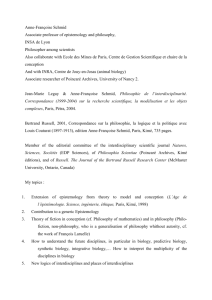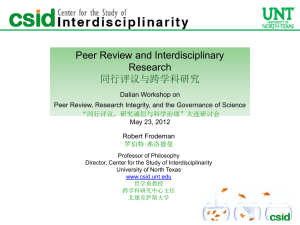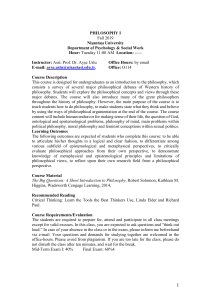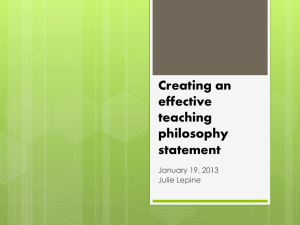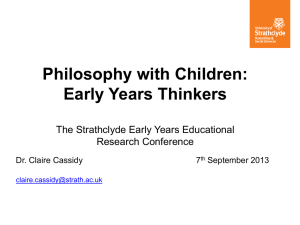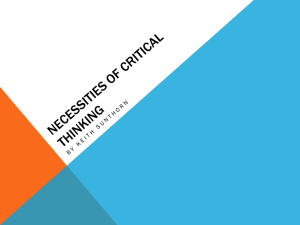Between Philosophy and Social Science
advertisement
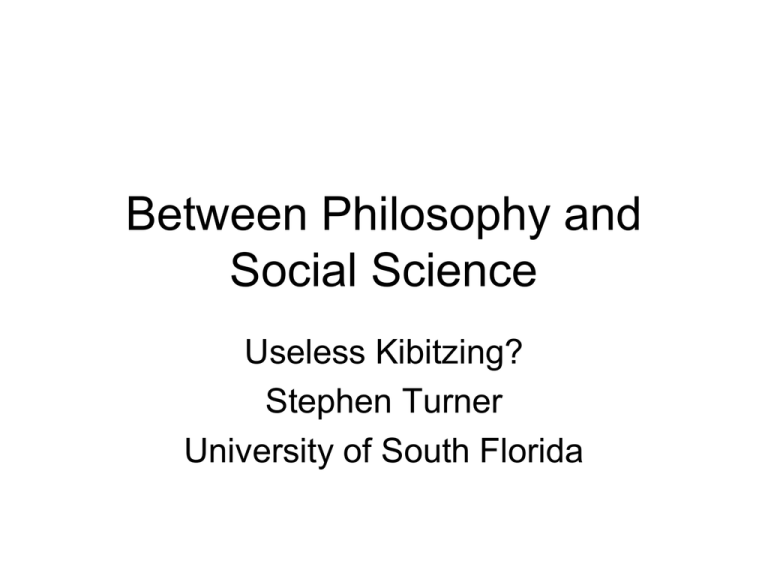
Between Philosophy and Social Science Useless Kibitzing? Stephen Turner University of South Florida Two Perspectives • Big Difference between personal strategies in face of disciplinary differences and institutional “solutions” or reflections on successful institutional practice. Some Personal Strategy Issues • Two extremes: • Asserting special authority of philosophy over some domain-- the normative, for example. • Going native– write in a way that is indistinguishable from the “professionals” in these fields, rather than assert some sort of external disciplinary authority. Advantages of Going Native • Sense of having to earn your way into a disciplinary discussion by paying dues. • Learn a lot, some of which you can use later in other contexts. • Have the comparative advantage of having a different viewpoint than the conventional academic in these fields. • Get an identity as the “philosopher of x” in different little fields. Disadvantages • No one really understands you. • Become famous in little villages rather than developing a coherent rep in which the “project” is visible and the elements reinforce one another, even if it is coherent. • Need to get people to read your stuff– but unlike disciplines, where readers rely on disciplinary knowledge that someone is important, one must earn the audience again and again. “Conceptual” Problems on Personal Level • Can’t rely on basic logical considerations outside philosophy, e.g. deduction, theory. • Social scientists don’t generalize and tend to think that minor differences in positions free them from problems. • Residual Kantian “resources of reason itself” model in philosophy keeps people from treating the big conflicts in other disciplines as philosophically interesting. • Kantian-induced tendency to ghettoize/immunize philosophy from issues with empirical content: hence collective intentionality is protected by saying it is a normative concept, and the discussion becomes “philosophical social theory” (Gilbert) rather than a contribution to a discussion in social theory. But there are positive Models, individual and institutional • In philosophy: Suppes, Davidson, Pettit, maybe MacIntyre. • In social science/jurisprudence: Zolo, Lukes, Agemben. • Interdisciplinary fields: success story of Italian philosophy/sociology of law and jurisprudence. Decision theory in the fifties before it was ghettoized/mandarinized as “philosophical” Why Disciplinarity is Hard to Give up • Career realities: mandarins and narrow disciplinarians always win disciplinary contests– as recorded and co-produced by Leiter, but evident also in economics, and sociology. • Matthew effect doesn’t work outside of disciplines. • Disciplines as coercive apparatuses provide powerful means of producing responses, assigning status, rewards, and so forth. Disabilities of Interdisciplinarity • International differences in academic systems usually mean that narrow disciplinary stuff transfers fairly well, interdisciplinary stuff doesn’t, and same for reputation, ability to get responses. • Book Review problems as example. • Social theory as example of institutional location problems solved differently in different national systems. Interdisciplinary Philosophy and Philosophy of Interdisciplinarity • Philosophy that pays attention to nonphilosophers seems to be working definition of “interdisciplinary philosophy”– at least among my students. • Can one say something “philosophical” about interdisciplinarity? Maybe about interdisciplinary philosophy, and philosophy in general, by seeing what kind of kibitzing is actually “useful.” Some Basic Conflicts • going native and giving up authority vs. authority of discipline/in discipline. • Is there philosophical “expertise” that can be provided in a setting of interdisciplinary collaboration as in science? Or is the relation inherently dialogical/Socratic? • Paradox of incommunicability: if they understand it already, they don’t need us to tell them; if they can’t understand it, it doesn’t matter if we tell them. So there is a narrow and self-vanishing space for useful Some Happier News • Collaboration is easy, if you aren’t publishing in J.Phil and are interested in the fields in question. • Lots of good examples– Martin Hollis with S. Smith) Explaining and Understanding International Relations, 1990. Avocational interest for Hollis (nephew of head of MI5) worked from 1963 to 1966 at the Foreign Office. • Did get read in IR. 634 citations! • But techno-ethics guys never heard of it, and neither did philosophers of social science. One Disheartening example: Causality • Literature stemming from David Lewis’s papers. Applies to nothing because it ignores confounding. Nevertheless this flourishes as a field in analytic philosophy. • Clark Glymour, Judea Pearl, Paul Humphreys, James Woodward and Causal modeling. Applies to what people actually do. Is all about confounding. • Lot’s of philosophical careers for analytic philosophers about the David Lewis stuff, not much for the other stuff, which is more demanding, requires more non-philosophical knowledge.. Lessons • The predictable result of disciplinarity and purely internal competition is that a powerful coercive disciplinary hierarchy is generated that reflects the competition, rather than the supposed larger purposes of the discipline. • There is no free lunch for stepping out of this competition, and there are real costs. • Institutional (and personal) solutions need to mitigate these costs in order to be attractive.
